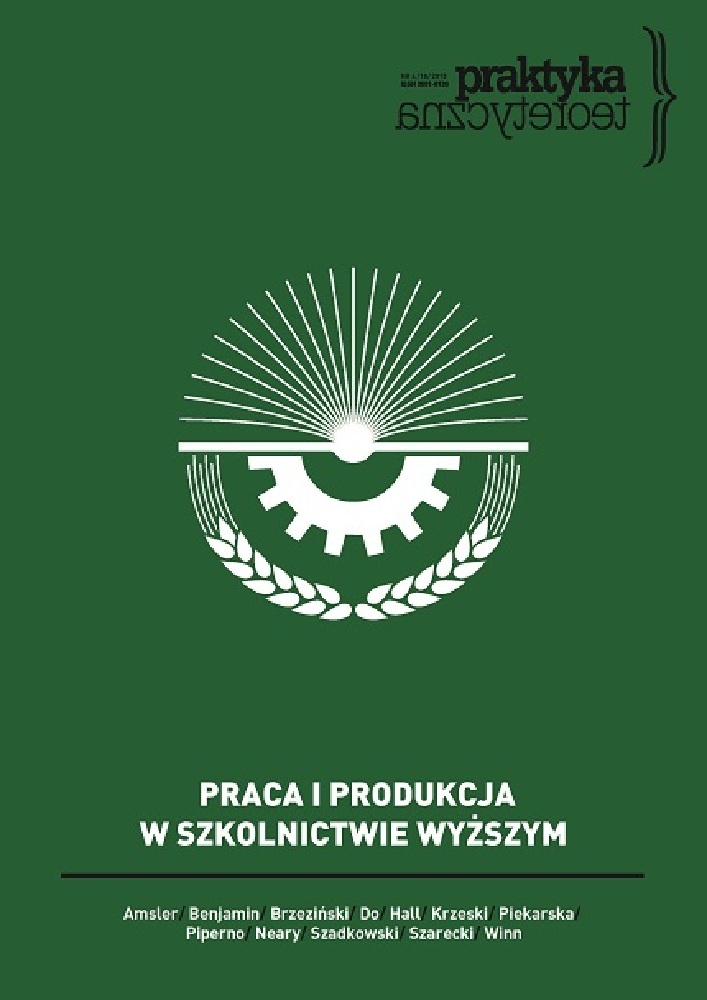Abstract
In this short introduction to the thematic issue of Theoretical Practice we draw on the Marxist concept of critique to explain how Marxist higher education research could be understood as a constituting practice within-against-beyond the contemporary university in crisis.References
Althusser, Louis. 2006. Ideologie i aparaty ideologiczne państwa. Tłum. Andrzej Staroń. Warszawa: Studenckie Koło Filozfii Marksistowskiej. http://www.filozofia.uw.edu.pl/skfm/publikacje/althusser05.pdf.
Antonowicz, Dominik. 2015. Między siłą globalnych procesów a lokalną tradycją. Polskie szkolnictwo wyższe w dobie przemian. Toruń: Wydawnictwo Naukowe Uniwersytetu Mikołaja Kopernika.
Ball, Stephen i Youdell, Deborah. 2008. Hidden Privatisation in Public Education. Brussels: Education International.
Barnett, Ronald. 2015. „In Search of a Public: Higher Education in a Global Age.” W O. Filippakou i G. Williams (red.), Higher Education as a Public Good. Critical Perspectives on Theory, Policy and Practice (s. 15-28). New York: Peter Lang.
Edu-factory Collective. 2009. Towards a Global Autonomous University. New York: Autonomedia.
Hall, Richard. 2015. „The University and the Secular Crisis.” Open Library of Humanities 1(1).
Hardt, Michael. 2012. „Komunizm jest bezwględną krytyką wszystkiego, co istnienie.” Praktyka Teoretyczna, http://www.praktykateoretyczna.pl/michael-hardt-komunizm-jest-bezwzgledna-krytyka-wszystkiego-co-istnieje/
Hardt, Michael i Negri, Antonio. 1994. Labor of Dionysus. A Critique of the State-Form. Minneapolis: University of Minnesota Press.
Harvey, David. 2014. Seventeen Contradictions and the End of Capitalism. London: Oxford University Press.
Holloway, John. 2010. Crack Capitalism. London: Pluto Press.
Jongbloed, Ben. 2003. „Marketisation in Higher Education: Clark’s Triangle and the Essential Ingredients of Markets.” Higher Education Quarterly 57(2): 110-135.
Leslie, Larry i Slaughter, Sheila. 1998. Academic Capitalism. Politics, Policies and Entrepreneurial University. Baltimore: Johns Hopkins University Press.
Mandel, Ernst. 1999. Late Capitalism. London-New York: Verso.
Marginson, Simon. 2006. „Putting „Public” Back into the Public University.” Thesis Eleven 84: 44–59.
Marks, Karol. 1956. Kapitał, t. 1. Warszawa: Książka i Wiedza.
Marks, Karol i Engels, Fryderyk. 1961. „Ideologia niemiecka”. W MED, t. 3. Warszawa: Książka i Wiedza.
Schrecker, Ellen. 2010. The Lost Soul of Higher Education. Corporatization, the Assault on Academic Freedom, and the End of the American University. New York: The New Press.
Szadkowski, Krystian. 2015a. Uniwersytet jako dobro wspólne. Warszawa: PWN.
Szadkowski, Krystian. 2015b. „Teza o hybrydyzacji tego, co publiczne i tego, co prywatne w szkolnictwie wyższym oraz jej konsekwencje. Próba krytyki.” Nauka i szkolnictwo wyższe 46(2): 75-120.
Oliveira, Marcos Barbosa. 2013. „On the Commodification of Science: The Programmatic Dimension.” Science & Education 22(10): 2463-2483.
Raunig, Gerald. 2008. „What is critique? Suspension and recomposition in textual and social machines.” Transversal , http://eipcp.net/transversal/0808/raunig/en
Rikowski, Glenn. 1997. „Scorched Earth. Prelude to Rebuilding Marxist Educational Theory.” British Journal of Sociology of Education 18(4): 551-574.
Roggero, Gigi. 2011a. Pięć tez o dobru wspólnym. Tłum. Piotr Juskowiak, Krystian Szadkowski. Praktyka Teoretyczna 4: 69-83.
Roggero, Gigi. 2011b. The Production of Living Knowledge. Philadelphia: Temple University Press.
Williams, Raymond. 1988. Resources of Hope. Culture, Democracy, Socialism, London: Verso.
License
“Theoretical Practice” seeks to put into practice the idea of open access to knowledge and broadening the domain of the commons. It serves the development of science, thinking and critical reflection. The journal is published in open-access mode under the CC-BY-NC-SA 4.0 license (detail available here: http://creativecommons.org/licenses/by-nc-sa/4.0/). Articles published in the journal may be freely distributed, stored, printed and utilized for academic and teaching purposes without restrictions.
They should not be, however, used for any commercial purposes or be reconstructed into derivative creations. Access to the journal may not be limited or offered for a fee by any third party.
Prospective authors are obliged to fill in, sign and send back the publishing contract compliant with the CC licencing. [PL.pdf, PL.doc, EN.pdf,EN.doc].
According to this contract, authors grant the journal a non-exclusive right to publish their work under the creative commons license (CC-BY-NC-SA 4.0) without any financial obligation on both sides of the contract.
Before submission authors should make sure that derivative materials they use are not protected by copyright preventing their non-commercial publication. Authors are responsible for any respective copyright violations.
